全国统一学习专线 8:30-21:00
来源: 南京威雅学校 编辑:佚名
你会如何想象南京威雅学校幼儿园宝宝的一日生活?在南京威雅学校幼儿园,老师们皆有十年以上的教龄,但依然能够为每天与孩子们发生的故事感到惊喜——老师们有故事,教育才会保持温度,才会有能量。
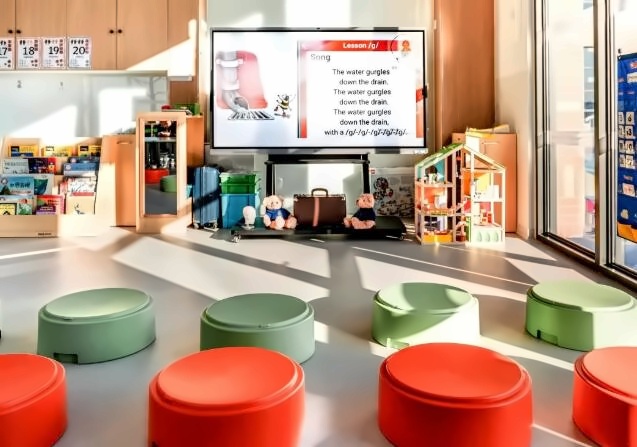
优秀的夸张派表演家
幼儿园大班主教艾琳老师的手上经常拿着一个手鼓,随手摇一摇一段悦耳的声音便流淌出来,与之对应的是孩子们的反应。经过两个多月的过渡,孩子们已经知道不同的铃声对应着不同的要求,需要安静的铃声,老师有话要说的铃声,大家一起动起来的铃声…
艾琳老师身上更加吸睛的一个特点是,夸张的表情和身体动作,但给人留下的只有浑然天成的映像。在孩子们的世界里,哪怕是再细小的事情也会引起他们的注意力。所以想象一下,当艾琳老师用夸张的表情演绎某种现象时,孩子们会是什么反应呢?
By creating different rhythms with the tambourine in her hand, Mrs. Erlynn Cabanayan manages to have the class’s attention totally under her control. After 2-months spent together at school, the children are familiar with this artistic signal and can accurately interpret and follow the various commands delivered through it. For example, a quiet sound means it is time to stop and listen to the teacher.
Another eye-catching skill of Mrs. Cabanayan is her exaggerated facial expression and body language and movement. Children’s capability of capturing even the smallest of movements can be underestimated. Therefore, the impact of large, exaggerated movements and expressions of children’s learning is phenomenal.
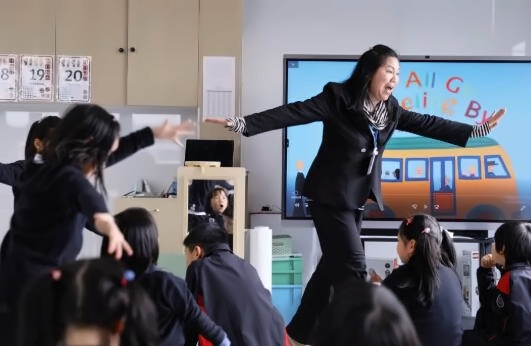
►艾琳老师在示范
每一天的圆桌时间,是孩子进入正式学习的前奏。在这段时间里,担任“星期观察员“和”天气观察员“的小朋友们,都会用唱歌的方式描述具体的年月日和天气状况。艾琳老师则会在旁边通过节奏的变换来调动孩子的注意力。
“要用很快的速度唱哦~一起跑动起来”
“这一次要用更快的速度唱哦~加速跑”
Circle time is the prelude to daily routine here at WASNJ kindergarten. Children named by Mrs. Cabanayan as the ‘weekly monitor’ and ‘weather monitor’ are asked to describe to the other students about what day/date it is today and what the weather is like for that day. The teacher helps to maintain the children’s attention by continuing to play different rhythms on the tambourine.
原本还只是轻轻摇摆身体,三言两语跟唱的孩子们,就像上了发条一样,专注力快速上升,模仿着艾琳老师的动作,手脚快速摆动,笑声不断。“在和孩子打交道的过程中,要用孩子的语言和方式来,必要的夸张和演绎示范,是向孩子们传递一种信号——我和你都一样。”艾琳老师告诉我。
圆桌时间的另一个重点是不断向孩子们强调班级规则,建立他们的秩序感、责任感和安全意识。比如,该怎么正确拿剪刀。
艾琳老师和婷婷老师声色生动地演绎了一番被不正确拿剪刀误伤手臂的动作时,孩子们不一而同都发出“啊~咦~哦”的声音,然后艾琳老师神态严肃地问孩子“这样做,对吗?”孩子们都一致的摇头。“那么,应该怎么拿?” “要用掌心握住剪刀的前端,再递给同伴。”孩子们你一言我一语的回答着。
专注力是幼儿身上非常稀缺的心智资源,圆桌时间不是单纯地让孩子坐在垫子上听,而是创设多种对话互动的情境,唤醒孩子们主动学习的意识后,每日的主题课学习便开始了。
Slow body movements gradually turn into laughter along with fast arm swings and footsteps. ‘You have to use language they can understand when communicating with children. Giving examples and exaggerating movements and expressions are necessary to encourage the children to participate. This sends them the message that everyone can do it- adults and children.’ Said Mrs. Cabanayan.
Another important message at circle time is respect for rules, which aim to build up children’s sense of order, responsibility, and mindfulness. In order to teach children how to hold scissors properly, Mrs. Cabanayan and Ms. Zhu demonstrate the result of pretending to be hurt by incorrectly holding them. Unanimous headshaking from the children when asked by the teacher ’Is this correct?’. This is followed by another round of engaging discussion when asked again by the teacher ‘What is the correct way to hold these?’
Teaching children to be focused is not an easy job. Settings such as circle time are conducted to create interactive learning opportunities. This allows students to awaken their minds to prepare them for their daily active learning.
时时刻刻的观察家
既动手又动脑的活动,才能加厚幼儿园学习的深度。最近,孩子们以交通旅行为主题开展系列学习。艾琳老师提供了行李箱卡片、各种旅行物品的贴纸。孩子们要做的是先思考在什么季节去哪里旅行,然后用剪刀剪下对应的旅行用品贴在卡片旅行箱上。
这个时候,我发现婷婷老师在晗泺的身边蹲下,细心地告诉他应该用拇指和食指握住剪刀的手柄,虎口处要留一些些空隙,不要握力太紧否则会影响手指发力。然后拿起剪刀先示范给晗泺看,再手把手带着他剪下贴纸,并且告诉晗泺放学回去后要再多做一份剪纸。
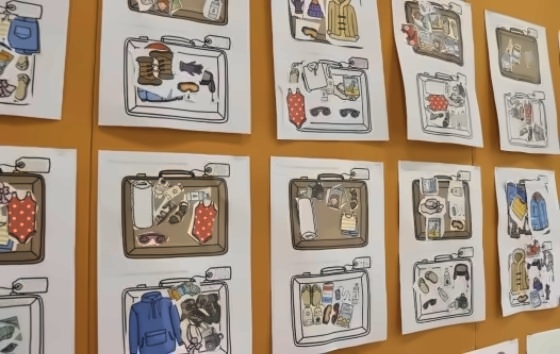
活动结束后,婷婷老师告诉我,之所以在手工活动上给到晗泺更多关注,是因为入学不久后她便发现晗泺在涉及到手部精细动作时会稍稍有些慢。而后与家长沟通后得知,孩子之前在国外幼儿园学习时疏忽了精细动作的锻炼,在家里又一直是长辈喂饭。婷婷老师便与家长商量了在课堂上会多引导晗晗,在家里父母也带着晗泺多做一些精细动作的锻炼。现在晗泺的手部动作已经比入学之初进步很多。
Children can benefit a lot from activities that develop both their fine motor skills and their brain. Recently in Kindergarten, the students have been learning about travel. They were required to not only think about the best travel spots for each season, but also to produce cut out pictures of travel necessities which were then glued on to their cardboard suitcase.
Ms. Zhu lowers her body and crouches alongside a boy named Hanluo who needs some guidance on how to correctly use scissors. Patiently, Ms. Zhu demonstrates many times and then she assigns the boy a challenge which is to practice cutting paper at home.
Ms. Zhu explained that she gave extra attention to Hanluo because she had observed his need to develop his fine motor skills. After communicating with the parents, she realised that similar learning opportunities were rarely offered at Hanluo’s previous kindergarten when he lived overseas. Also, he has always been fed by others at home. Bearing this in mind, Ms. Zhu has planned specific activities for Hanluo, who has consequently made a lot of progress since he enrolled.
主题课
老师们的合作观察在孩子们进入视线的那一刻也同步开始了。前不久,婷婷老师发现薇儿又想跑出教室外时,结合艾琳老师告诉她薇儿在排队时被其他小朋友插队的细节后,婷婷老师随即对薇儿耐心地说:“老师允许你有小脾气,但不能一生气就往外跑,这样我们会担心你。我们做个约定,下次生气的时候在教室里找个空间来舒缓情绪。”在和薇儿重复强调“约定”以后,即便习惯的改变很难,薇儿也渐渐地明白何时该控制情绪。
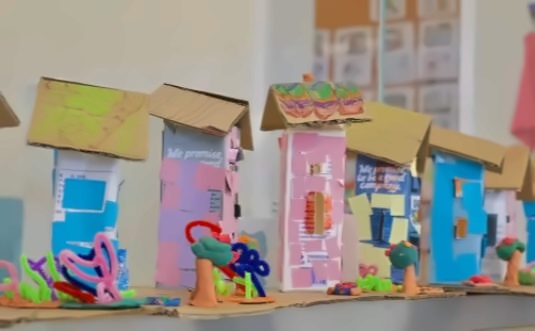
“对班级里的孩子会给到她们有边界的自由。每个孩子的边界和自由范围是不同的,面对孩子绝不能一刀切式地教育。孩子们其实都很聪明,感受到老师的真诚时,她们也愿意打开心扉。”婷婷老师解释说。
Teacher observations begin the moment they see the children. Believing that there is always a reason behind children’s behavior, Ms. Zhu suggested to make a deal with Weier when she observed her inclination to run out of the classroom. Weier’s unpleasant experience of witnessing someone queue-jumping may prompt her present habit of running away. As a solution to this, Ms. Zhu’s deal with Weier is that she can find somewhere inside the classroom to stay and sit quietly by herself as her way to calm herself down while staying safe.
‘Defining boundaries for every child in the class is necessary. Since every child is different, they each need different definition. Every child should be treated as a unique individual. Their intelligence and openness make communication easier particularly when they feel your sincerity.’ said Ms. Zhu.
幼儿冲突的调解员
一群懵懂的孩子刚刚迈入集体生活时,总会有大大小小的冲突时刻上演着。处理日日上演的幼儿冲突,是幼教们每天的日常。是选择把孩子单独拎出来私下调解,还是当着所有人的面指出对和错?老师解决冲突的过程,其实也是孩子们社会性发展的重要学习过程,对他们而言意义深远。
但对幼教们来说,真正解决幼儿冲突的前提是读懂孩子的行为。小班的殷萍老师给我讲述了两个细节。
班级里的瑞瑞总爱给布布拥抱、拉手手、摸摸布布的纱裙,但布布是个不太喜爱被过度亲密接触的孩子,没能躲过布布的动作时就会有小情绪。殷萍老师发现这个现象后,一厢单独和布布说“如果你不喜欢瑞瑞摸你的裙子,你要对瑞瑞大声的说出来。”几次的鼓励下,布布终于**次开口拒绝瑞瑞,立马见效。另一厢,她也拉过瑞瑞询问道“你是因为喜欢布布,才这样做的么?”瑞瑞肯定的点点头,但他还不知道给布布带来了小小困扰。
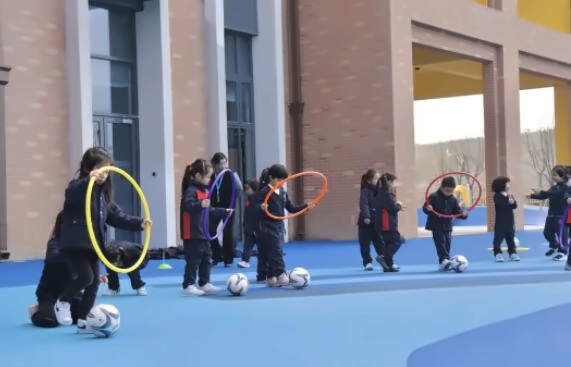
隔了几天后,班级里另外一个小朋友突然强制性的抱了瑞瑞一下,瑞瑞当即反抗。殷萍老师抓住机会和瑞瑞谈到“你喜欢他抱你的感觉么?”“不喜欢”瑞瑞摇头说。“没错,布布也是一样的感觉呀。所以,下一次我们换一种方式和布布玩好不好?”自那以后,瑞瑞对布布还是一样喜欢,但慢慢地不再给布布突然的亲密接触了。
Wherever children gather around, conflicts are inevitable. Coping with these conflicts has become a normality of teachers’ daily work. Teachers always need to make a choice between private talk and education with the class. For the children, solving conflicts is a learning process which can improve their social skills for life-long benefits.
To teachers, interpreting children behavior is the key to solving disputes. Ms. Yin from KG1 is particularly familiar with this guidance.
For those children who like their own personal space, they tend to be irritated by others’ close body contact. Ms. Yin would encourage these children to express themselves and explain how they feel. On the other hand, she also asks the other child about their motivations. Is it an act of kindness? If the answer is positive, Ms. Yin would explain how kindness can be shown in other ways as some children do not like close contact.
Creating opportunities through mediation to talk with the children about closeness, personal space, respect and empathy helps children to develop a healthy social relationship and appropriate interactions with each other.
另外一个故事细节是关于酷爱玩滑滑梯的迪伦。某一天,他躲在滑滑梯里不愿意乘校车回家。老师劝说无果后,只能让校车按时发车,迪伦则滞留在教室内。殷萍老师当下给迪伦的妈妈打描述情况并商量道“今天我们要合作演一出戏,要让迪伦知道不能因为贪玩耽误回家,不能没有时间观念。”
天色渐黑时妈妈赶到,但并没有立刻进入教室,而是由殷萍老师先和迪伦认真说“你看校车已经走了,如果你贪玩,大家是不会等你的。老师知道你是因为喜欢滑滑梯才想多玩一会,但每个人都有自己的事情要做,要遵循班级规则。”妈妈回家后也跟迪伦强调“不可以任性,如果因为贪玩赶不上校车,妈妈下一次是不会来接你的。”
校车按时发车、老师和妈妈的双重警告,终于让迪伦意识到了“她们没在开玩笑”。在之后的幼儿园生活中有了改变,比如到了吃饭时间却还想玩玩具时,开始会犹豫,会观望其他小朋友的进度。当然,这样的紧张感,对他来说,其实是好事。
Another story is about Dylan who loves slides. When Ms. Yin found Dylan was still playing on the slide instead of getting onto school bus and going home, she talked to the boy’s mother about Dylan’s unawareness of time and invited her to talk to Dylan together on how to respect other people’s time as well as possible result due to not following the rules. Following Ms. Yin’s direction, Dylan’s mom reiterated the significance of time management by telling the boy that ‘If you miss the school bus, you will need to face the consequence of being collected by no one until much later.’
Talks from different sides made Dylan realize that this was not a joke. His changes manifested themselves in later days. He began to watch if other children dropped their toys and got ready for snack. His observation and imitation behavior indicated that Dylan’s consciousness of time was gradually strengthening.
科班出身的幼教专家
翻阅中外教育部门对儿童教纲要求会发现,语言、社会、科学、艺术和健康是幼儿培育的几大重点。不同年龄段的孩子应该接受符合他们年龄特征的学习。这对幼教们提出了极高的挑战。
但南京威雅学校幼儿园的几位老师都毕业于学前教育专业,积累了十多年的幼教经验。其中,艾琳老师更是拥有长达20余年的教龄,殷萍老师则持有蒙特梭利AMI3-6岁主教资格证。
她们对幼儿教育的认知,不只是从理论知识而来,更是日复一日的实践和对现实问题的求知与感知而来,除了以上分享给我们的经历和细节,还有很多价值无限的经验心得。比如:
Highlighting the importance of language, social skills, sciences and arts are covered almost by every country’s learning framework for early years. Children of different ages should achieve corresponding age-related learning goals. This is seen as the biggest challenge for education of this stage. All KG teachers at WASNJ majored in Early Years Education and have worked in the industry as professional for more than 10 years. Among them, Mrs. Cabanayan has taught for more than 20-years and Ms. Zhu is a Montessori certified AMI3-6 teacher.
Their understanding of early years education is not only supported by their theoretical knowledge, but also by their daily interactions with the children. Apart from stories illustrated as above, some tips summarized by these professional teachers with multiple roles are also shared below:
# 在幼儿园的教学中永远要想在孩子之前,给孩子选择的机会。当遇到不善言辞的孩子时,要思考他这样做的背后原因,并提供选择给孩子,引导他们表达真实的想法。
# 和孩子之间建立信任感,不在于每天在校门口用微笑迎接他们,而是在日常的活动中**孩子理解“老师之所以这样做的原因”。
# 一视同仁并非是真正的平等。真正尊重个体差异在于看见每个孩子的特征,给到并记录符合他们个体的成长进度。
# 在幼儿园阶段培养孩子的情商远大于智商。情商好比是未来学习的土壤,智商是长出来的果实。复杂的手眼协调、专注力、控制情绪和冲动的能力比提前灌输知识更能帮助孩子拥有更好的未来。
# Always provide opportunities for children and let them make choices. Try to understand those who are less expressive and encourage them to articulate their thoughts.
# Build trust with children through explaining your ideas to them.
# Each child is a unique individual who deserves to be treated individually and be encouraged to grow in their own way.
# To develop their emotional intelligence is more important than their knowledge during their early stages of learning. Hand-eye coordination, concentration, and better self-control build the foundations for knowledge.
我问道老师们最后一个问题是“你会累么?”她们说“身体累了但心里满足了。”浮现在脑海里是看见每天清晨一见到自己便笑着跑进学校的小朋友们的时刻,是小朋友们不经意间轻轻地把脸搭在自己手上的时刻,是过往带过的孩子打给自己说想念的时刻。
这些都是幼儿园里的非正式时刻,但却是老师与孩子们的真实情感写照,一层层搭建了老师们对幼儿教育的热情千层塔。
南京威雅学校报名、校园参观及了解招生动态,请: ,或通过下方报名通道登记。